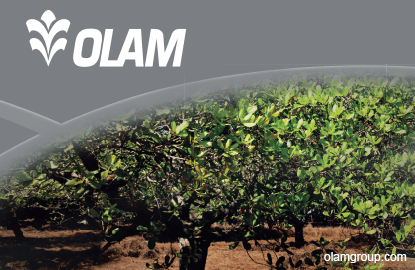
(Aug 28): The S$915 million ($654 million) cash that Mitsubishi Corp will pay for new shares of Olam International Ltd will help Singapore’s commodity trader fund acquisitions, according to Chief Executive Officer Sunny Verghese.
The rout in commodity prices and asset values is opening up opportunities for Olam to expand and the money from Japan’s biggest trading house will give it firepower, Verghese said Friday in an interview with Bloomberg Television.
Olam — which ranks in the world’s top three traders of coffee and rice — agreed to sell a 20% stake to Mitsubishi in two deals worth a combined S$1.53 billion. The first will see Tokyo-based Mitsubishi buy 332.7 million new shares; in the other, Olam’s founding investor, the Kewalram Chanrai Group, agreed to sell an 8% stake to the Japanese company.
Growth Capital
“It provides growth capital,” Verghese said. “Given current commodity market environment and the general macro, we believe this will present us with a few interesting accretive opportunities in line, and consistent, with our strategy.”
The company is considering a pipeline of opportunities and will split the cash between new investments and capital to grow existing assets, Verghese said on a conference call on Friday.
Olam will expand in markets where it already has a strong position, including in Africa, Yutaka Kyoya, Mitsubishi’s chief operating officer of the living essentials group, said on a conference call on Friday. Mitsubishi expects Olam’s profit to double in 10 years time, he said.
The deal is also the latest sign of Asian trading houses spending billions of dollars in agriculture, betting that fast- growing populations in the region will need more food.
Deal Premium
The new shares were priced at S$2.75 a piece, a 63% premium to Olam’s close on Wednesday and a 29% premium to the 2014 trading average. The company had fallen 25% in the year before today as commodity prices fell across the board on a stronger US dollar and a slowdown in China’s economy.
Olam climbed 8.9% to S$2.08 at 4.12pm in Singapore, the highest since December 2014.
Mitsubishi and Olam have had a working relationship for more than 20 years, Verghese said. The Japanese firm made the best bid after “multiple parties” showed interest in Olam, he said, declining to name the other parties.
The investment by Mitsubishi is a sign of confidence in a company that in the last three years faced an attack from US short-seller Muddy Waters LLC and questions about its finances and operations. The Japanese trader will become the second-largest shareholder in Olam after the deals close with Singapore’s Temasek Holdings controlling 51%.
“We welcome Mitsubishi as a strategic partner in Olam, and look forward to working with them,” David Heng, senior managing director for investments at Temasek, said in an e-mailed comment.
Temasek took a controlling stake in Olam in March 2014 to help the company fend off Muddy Waters attacks. The US short-seller led by Carson Block in 2012 questioned Olam’s ability to generate cash and the quality of its African businesses, causing the stock to plummet.
Board Representatives
Mitsubishi initially sought a 20% stake in Olam, while the Singapore firm wasn’t willing to issue more than about 12% in new shares, Verghese said. The Japanese trading house then approached the Kewalram Chanrai group to buy more shares in a separate transaction, he said.
Mitsubishi will send three representatives to join Olam’s management and two will join the board, Verghese said. The purchase will generate 5 billion yen ($41.4 million) to 10 billion yen in annual returns for the Japanese company within five years, Mitsubishi’s Kyoya said.
Strategic Partner
The Mitsubishi sale was not as much about cash as gaining a strategic partner to help Olam expand sales of its food materials in the UK, Southeast Asia and Japan, Verghese said. Olam will help Mitsubishi grow its African business and rice farming, flour milling and packaged foods are areas the two will look at, he said.
In June last year, Mitsubishi agreed to pay $64 million for 80% of Olam Grains Australia to give it control over a business that handles more than 1 million metric tons of grain a year. The same year, Sanyo Foods Co, a unit of Mitsubishi, agreed to purchase 25% of Olam’s packaged-food division.
In 2013 Marubeni Corp, Japan’s biggest agriculture trader, made a company record purchase of US grain merchant Gavilon Holdings LLC for $2.7 billion plus debt. Cofco Corp, China’s largest food company, spent $3.5 billion last year to build a global grain trader, acquiring controlling stakes in Noble Group Ltd’s agribusiness and Dutch trader Nidera BV.
Olam, which began with one product — cashew operations in Nigeria in 1989 — has spent the last two years adjusting its assets, selling stakes in its Australian grain and packaged food businesses, while expanding in cocoa. Olam agreed to pay a company record $1.3 billion to Archer-Daniels-Midland Co for its cocoa business, a move that would elevate it into the top-three processors. The deal is expected to close this year.
While Olam isn’t a household name, it’s a $3.7 billion firm and supplies materials to companies including PepsiCo Inc. and Nestle SA and one in eight chocolate bars eaten globally is made from beans handled by the company. The quantity of rice it handles annually could feed all of Africa for a week.
“We were pleasantly surprised” by the number of companies that showed interest in investing in Olam, Verghese said.